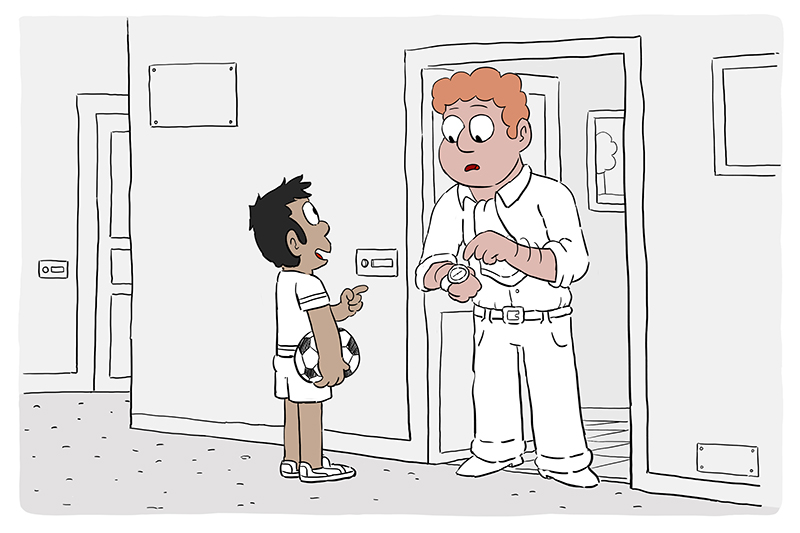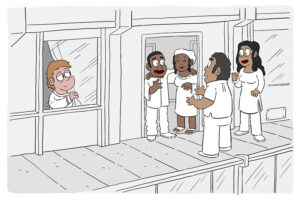
Juan Carlos is from Guatemala, is 14 years old and loves to play soccer. He plays often: at the soccer club, but also in the street. Now he lives in the Netherlands for a few months and he has already met a few boys from the neighborhood who regularly play soccer on the square. He is an enterprising boy and goes with the ball under his arm to the house of his new soccer buddy, Stefan. Juan Carlos rings the bell around dinner time, it is six o’clock and therefore dinner time, but Juan Carlos doesn’t know that yet.
Bas’ father opens the door. How nice of that boy to come and get Stefan, but we’re about to have dinner. Pretty strange that that boy should ring the doorbell at precisely this time. Everyone in the Netherlands eats dinner at 6, right? “Then the whole family is sitting around the table and you don’t want to be disturbed,” Stefan’s father thinks. “Don’t you know what time it is? Bas can’t come now,” he tells the boy. Kindly, but clearly. And closes the door.
Juan Carlos is not sure what to do. What has happened? Maybe he said something wrong? “The father looked angry and asked if I didn’t know what time it was. I knew that, it was 6 o’clock. Stupid question. Maybe Stefan has punishment. It did smell nice! Maybe they were going to eat. I could have waited at the table then, couldn’t I? Mom loves it when people join in.” Juan Carlos bounces the ball a bit and drops off again.
What happened?
The daily schedule in the Netherlands often has strict times: lunch at one-thirty, dinner at six, and from ten you are expected to stop making noise. These times are often expected to be respected. That also means that if you are invited somewhere between 12:00 and 18:00 you can expect coffee and cookies, but no meal…”
In so many other cultures, these and almost all times are less strict. Also for eating. Also in Guatemala. There is always food, even for the unexpected guest. We cook measured meals, just enough for the family. Plates empty. And if there are leftovers, there is the leftover day.
Here you can clearly see the I culture. Dinner doesn’t take very long either and right after dinner we quickly continue with plans for the evening. I have been amazed at what the Dutch do after dinner in the evening! No wonder most like to be finished at work by five.
Juan Carlos will have to get used to those times. And ringing the bell at six will end in disappointment. He’d better ring the bell later, or ask Stefan to come get him. Maybe his mother can also cook a little earlier so he can go play on time.
On the other hand: Stefan’s father can also go along with Juan Carlos’ enthusiasm for once and ask him inside to maybe set an extra plate. Everyone one less potato. A good opportunity to get to know each other better and talk about each other’s habits!
I cultures such as the Dutch have a task-oriented communication and time awareness. That means that the day is divided into tasks and there are certain times for that. This applies to appointments between friends, work, leisure activities and for dinner.
We-cultures do not have such tight time schedules, food is about togetherness, sharing and thus relationship. That takes time and so that is not skimped on. So the daily schedule is less strict and is flexible depending on circumstances.
In short
For Stefan’s father:
- Accept that Juan Carlos comes from a we society.
- You are always welcome, even if it is not quite convenient.
- Create the opportunity to talk about hospitality.
- Be extra alert to the guest’s body language, which may be sad, but does not “really” show it.
- Enjoy the presence of someone from another culture.
For Juan Carlos:
- Accept that Stefan comes from an I society and the family often keeps to itself.
- The portions of food prepared are usually precisely measured.
- In Holland, dinner is served between 5:30 and 7. You’d better call or wait and see.
- Above all, ask your questions. The Dutch are used to being addressed directly.
Want to read more about culture dimensions?
Important to know:
This anecdote is based on stories shared with us. Connect2Us strives to highlight the dilemma from both sides and not to label people or suggest that one or the other should behave differently. We see in our daily intercultural work that awareness by those involved is enough to move toward each other without pretending to be very different. Connect2Us aims to help readers recognize and avoid prejudice. Read about prejudice, discrimination and racism here.

